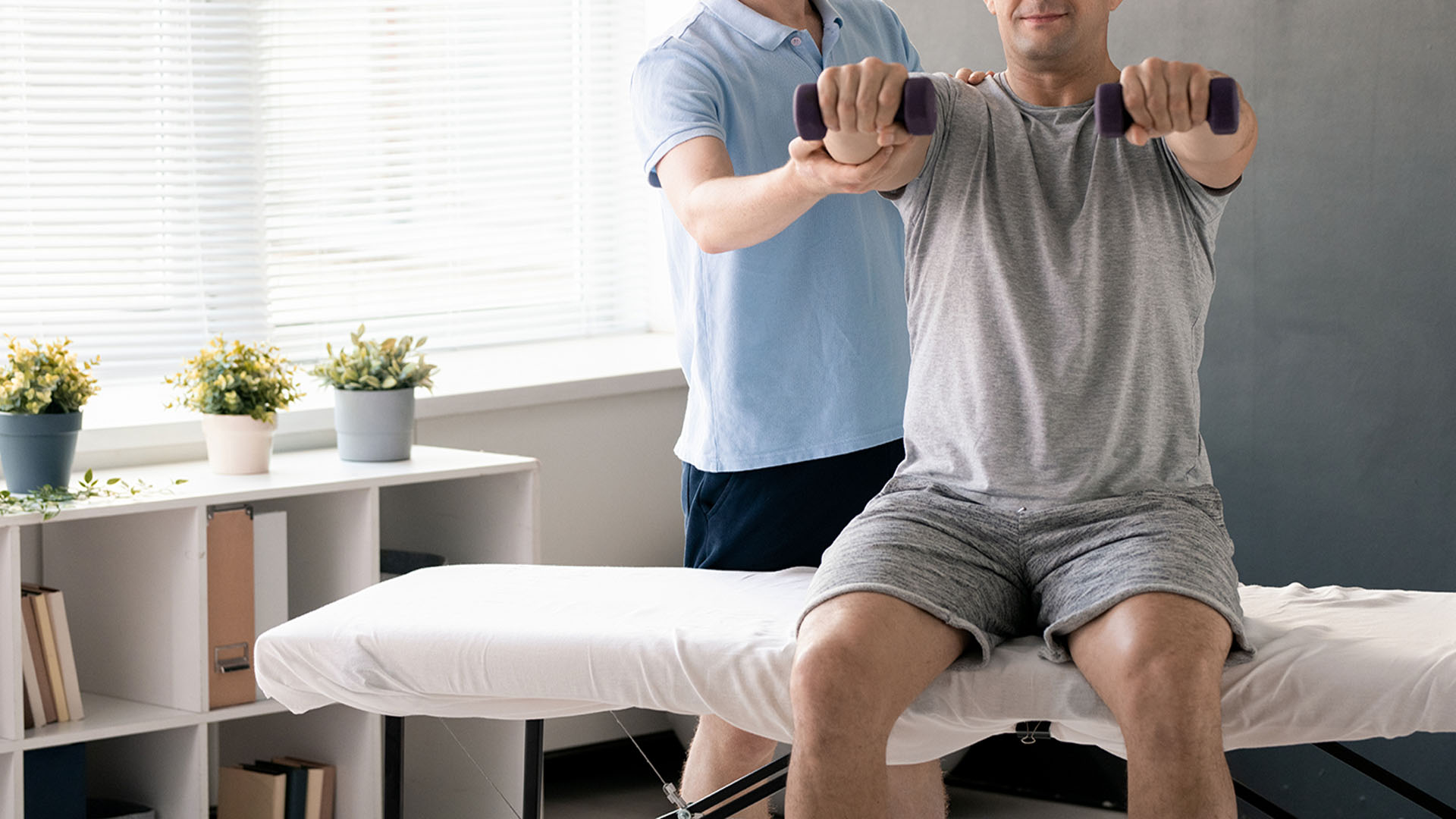The sports medicine branch of healthcare covers physical fitness, including treatment and prevention of injuries for those in sports or who exercise often. While many professional athletes use sports medicine, it’s for everyone in sports, from children to adults, including those who exercise regularly. Injuries are a common problem with both exercise and sports that require dedicated comprehensive care.
What is Sports Medicine?
Sports medicine consists of any care delivery type with a focus on prevention and rehabilitation for sports-related injuries. This means there are multiple specialties and an array of provider types that fall under this category of care.
Overall, sports medicine encompasses four main objectives: injury prevention, diet and nutrition, exercise, and injuries or medical conditions. By covering all aspects of sports medicine, doctors can help patients stay healthy in all aspects while helping to educate them to prevent other issues.
A common misconception about sports medicine is that it is a niche for strictly professional athletes. Sports medicine is actually utilized and encouraged for those of all age ranges and activity levels. Sports medicine may involve a combination of various specialties working toward the goal of optimal physical performance for their patient. This may be inclusive of injury prevention and rehabilitation, training, and nutrition plans.
Understanding Sports Medicine
Definition and Scope of Sports Medicine:
Sports medicine encompasses a wide range of practices aimed at enhancing athletic performance, ensuring the health and safety of athletes, and aiding in quick recovery from sports-related injuries. The field caters to professional athletes and those engaging in physical activity, aiming to optimize their health and activity levels. Sports medicine integrates knowledge from various medical disciplines to address physical and psychological aspects of sports participation and injury management.
Types of Professionals in Sports Medicine:
The field of sports medicine involves a multidisciplinary team of professionals dedicated to the comprehensive care of athletes and physically active individuals. This team includes sports medicine doctors who specialize in the diagnosis and treatment of sports injuries, physical therapists who design rehabilitation programs to restore function, exercise physiologists who assess physical fitness and help optimize performance, athletic trainers who provide immediate care for injuries and develop injury prevention programs, and nutritionists who advise on optimal nutrition for performance and recovery. Each professional is vital for a holistic approach to sports healthcare, working together to support an individual’s return to activity and improve their overall well-being.
Common Roles and Responsibilities of a Sports Medicine Doctor:
A sports medicine doctor’s responsibilities extend beyond treating acute injuries, like sprains and fractures, to managing chronic conditions that can affect performance, like asthma or diabetes. They conduct physical evaluations, prescribe treatments, and recommend rehabilitation strategies. They also provide guidance on injury prevention, nutrition, and exercise programs to reach specific athletic goals. These doctors serve as advisors, helping athletes make informed decisions about their training regimes and recovery processes, for the care of injured athletes and optimization of athletic performance.
What is The Purpose of Sports Medicine?
Sports medicine is meant to help patients achieve their athletic performance goals, prevent injuries due to physical activity, and treat both acute and chronic sports-related injuries. Heavy involvement in sports and even day-to-day physical activity can lead to wear and tear or injuries to the body. Sports medicine may be a combination of care delivery types utilized to address the scope of needs of patients with active lifestyles. While the public perception of sports medicine may be that it is solely for top performing athletes, that is not the case. Treatment of injuries related to any form of activity often require multiple levels of care and rehabilitation. For example, an athlete may need a nutrition plan, performance training, and physiotherapy in order to achieve their sports-related goals.
Sports medicine exists to evaluate, diagnose, and manage common health problems related to sports, orthopedics, and exercise. As such, the main objects of sports medicine is diagnosis and treatment of chronic and acute sports issues, orthopedic injuries, along with issues with tissue, bone, and nerves. Furthermore, the goal is to use care to prevent issues.
Doctors will need to develop a comprehensive overview of their patients to care for acute and chronic illnesses. By doing so, doctors can help with preventative care while assisting people in engaging in safe exercise to achieve their training goals. The practice focuses on the physiology of sports science, exercise, orthopedics, biomechanics, nutrition, and psychology.
Additionally, sports medicine involves more than just a doctor but a team of specialists. The team could include physicians, surgeons, athletic trainers, sports psychologists, physiotherapists, nutritionists, coaches, personal trainers, massage therapists, and more. Together, this team can help athletes to stay healthy and comfortable for years.
What is a Sports Medicine Physician?
A sports medicine physician is a specialty provider that works with musculoskeletal injuries caused by sports or other types of physical activity. Sports medicine physicians offer a full spectrum of care to address the array of needs one patient may have related to prevention and treatment of injuries due to physical activity. This may be inclusive of a range from rehabilitative services to nutrition plans.
With sports related injuries, the role of a sports medicine physician is to diagnose, identify a treatment plan, and get their patient back to the most optimal performance they can be post injury. Sports medicine physicians may also focus on a patient’s preventive care needs, such as strengthening muscles to prevent injury. Sports medicine physicians treat patients of varying age ranges and varying levels of activity. For example, a sports medicine physician may treat a child who broke their bone playing soccer and an older adult who is suffering from sore muscles. Some sports medicine physicians may choose to specialize with certain age groups or injury types. For instance, a sports medicine physician may choose to solely work with growing children and teens as their care needs are often different from an adult.
How to Choose the Right Sports Medicine Doctor
Qualifications and Experience to Look For:
Seek a sports medicine doctor with board certification and a specialization in sports medicine. Experience treating athletes or active individuals is important. Look for someone who updates their skills through continuing education in the latest sports injury treatments and prevention techniques.
The Importance of a Good Patient-Doctor Relationship:
A positive patient-doctor relationship is the key to effective treatment. Choose a doctor who listens, understands your specific athletic goals, and communicates clearly. Comfort and trust in your doctor will enhance the care experience and contribute to a successful recovery.
Tips for Finding a Reputable Sports Medicine Doctor in the Portland Area:
Ask for referrals from your primary care physician, local athletic organizations, or fellow athletes. Check online reviews and the doctor’s professional affiliations.
What are Some Examples of Sports Medicine?
Sports medicine can involve any injury, including a pulled hamstring, Achilles tendinitis, concussion, ankle sprain, shoulder injury, plantar fasciitis, hip bursitis, lower back pain, quadricep sprain, shin splints, torn knee, groin pull, and much more. Pain management is another example of sports medicine, including prescriptions, medications, spinal decompressions, electrical stimulation, and temperature therapy.
Furthermore, examples could include passive treatment like ultrasound, massage, dry needling, mobilizations, or laser therapies. Active treatments can consist of sports physiotherapy, stretching, exercises, and other treatments that require work from the patient. Sports medicine can cover children as well, including growth spurts, growth plate injuries, nutritional issues, and health education.
Diagnostics are an important aspect of sports medicine, as is preventative care. Taking x-rays, MRIs, diagnostic ultrasound, and other images are all important parts of sports medicine. All these different aspects work together for exhaustive care pertaining to every aspect of sports care.
Another example of sports medicine includes the use of medical tools. From mouthguards to crutches, sports medicine providers have various tools available to assist sports players and exercise enthusiasts in recovering, cope with chronic pain, and deal with other aspects of their health. Furthermore, a sports medicine team can help patients figure out what issues they may be susceptible to and prevent them before they become a problem.
What Conditions Does a Sports Medicine Specialist Treat?
Sports medicine treats all issues related to any form of activity, including musculoskeletal and other injuries as well. Any body part you can hurt during activity falls under the range of sports medicine. From common issues to more complicated problems, sports medicine can help.
Use sports medicine to treat ankle sprains, fractures, hand or foot injuries, knee or shoulder injuries, tendonitis, or cartilage issues. Also, sports medicine can help with exercise-induced asthma, heat illness, concussions, head injuries, and eating disorders. Next, sports medicine covers nutrition, supplements, exercise, stretching, and injury prevention.
Everything from rotator cuffs to Achilles heel and much more fall under the realm of this specialized medicine. Also, the care covers pre-injury, recovery, rehabilitation, passive treatment, active treatment, and preventative care. In addition, education is an important part of sports medicine to help with understanding how the body works and how to use the body correctly to prevent injuries.
Sports medicine is a comprehensive approach that can treat or prevent a variety of sports related injuries. Common reasons for seeking a sports medicine doctor include:
Acute sports injuries– This may be inclusive of strains, sprains, torn ligaments, sudden pain or swelling, and weakness. Oftentimes treatment is inclusive of pain management therapies and rest, with some injuries resulting in the need for surgical intervention.
Chronic sports injuries- Very commonly, athletes will sustain injuries that develop and persist overtime. This is often the result of over training or continuing involvement in activity through an injury.
Sports injury prevention- Prevention is inclusive of many therapies that aim to strengthen and improve physical performance. These therapies may be inclusive of strengthening, stretching, and nutrition plans.
Sports injury rehabilitation- Rehabilitation services are intended to get a patient back to their activities after suffering a sports related injury. Treatments may be inclusive of physiotherapy, massage, medications, and more.
Sprains- Injuries to ligaments caused by stretching or tearing, common in ankles, knees, and wrists.
Strains- Injuries to muscles or tendons resulting from overstretching or tearing, often occurring in the back, neck, or legs.
What is The Difference Between Sports Medicine and Orthopedics?
Orthopedics is actually an aspect of sports medicine as sports care covers the complete health care of athletes. For orthopedics, doctors and surgeons deal with the actual injury. However, both specialties are trained in the care of the musculoskeletal system. In addition, sports medicine also covers non-musculoskeletal issues, including exercise-induced asthma, training, pain, conditioning, and much more.
An orthopedic doctor specializes in the musculoskeletal system, including bones, ligaments, joints, muscles, and tendons. Usually, you will only see an orthopedic doctor if you need surgery, although they can help with anything pertaining to the musculoskeletal system. They can care for issues with muscles, tendons, ligaments, bones, and cartilage.
Sports medicine consists of various treatment and provider types aimed at improving athletic performance and treating sports related injuries. Oftentimes, sports medicine is not inclusive of orthopedics, or surgery. While orthopedics also focuses on musculoskeletal intervention, it is commonly inclusive of surgical intervention. Many times, sports related injuries are non-surgical and involve therapeutic, rehabilitative and pain management focused care.
What are the Benefits of Sports Medicine?
As sports medicine focuses on whole health-related to activity, the main benefit is encompassing care. No matter the issue a sport or exercise causes, a sports medicine team can help with prevention, repair, rehabilitation, and recovery. The wide application allows for the doctor and team to care for every aspect of a problem.
Most doctors focus on a single aspect of health, but you get a team ready to look at the full picture with sports medicine. One of the best aspects of sports medicine is the ability to educate patients on nutrition. As the diet is such an important aspect of health, understanding what and how to eat requires attention in every aspect of life. Sports medicine can even assist with eating disorders and advice on supplements for a healthier you.
Furthermore, with sports medicine, you get more than a doctor; you get a team ready to help with every area of health pertaining to a sports injury or problem. In addition, when new and innovative treatments become available, sports doctors are more able to access these options and add them to your treatment plan.
Another benefit of sports medicine is it can improve your health naturally and help improve your strengths and weaknesses. Gain an edge in sports with a customized training plan and practices you can implement to improve in every area. In addition, if you have any particular issues within your sport or form of exercise, your sports team will help guide you for better form.
Does Insurance Cover Sports Medicine?
As sports medicine involves several experts and therapies, your insurance may cover a portion or all of your treatment. However, some areas may not be covered, like massage or other passive treatments. Insurance will usually cover doctor’s appointments and active treatments such as physiotherapy.
Call your insurance company to find out what they will and will not cover so you can budget for uncovered treatments or make alternative plans. Keep in mind, some insurance companies require referrals for other branches. Also, you may be able to use your work health savings plan to cover some of the cost of treatments insurance does not cover.
When Should You Go To A Sports Medicine Specialist?
1. After a Sports Injury
- Types of Sports Injuries: Sports medicine doctors are experts in treating a wide range of injuries, including but not limited to, sprains, strains, fractures, tendonitis, and dislocations. Their expertise ensures that such injuries are properly diagnosed and treated to facilitate effective healing.
- Importance of Prompt Injury Assessment and Treatment: Quick evaluation and treatment of sports injuries by a specialized doctor are essential to prevent further damage and complications. Prompt care can accelerate recovery and help to create a rehabilitation plan to safely return to physical activities, reducing the risk of re-injury.
2. For Pain Management
- Chronic Pain Vs. Acute Pain in Athletes: Athletes experiencing acute pain from recent injuries require immediate care, while chronic pain, persisting beyond the expected healing time, may indicate underlying issues. Sports medicine doctors assess both types to provide targeted treatment, facilitating recovery and maintaining performance.
- Non-Surgical and Surgical Treatment Options Available for Managing Pain: For managing pain, sports medicine doctors offer non-surgical options like physical therapy, medication, and lifestyle adjustments. When necessary, they may also recommend surgical interventions to address more severe or unresponsive conditions, ensuring a comprehensive approach to pain management.
3. For Performance Enhancement
- How Sports Medicine Doctors Can Help Improve Performance Through Tailored Training and Nutrition Plans: Sports medicine doctors enhance athletic performance by developing customized training and nutrition plans based on individual needs and goals. These plans optimize physical condition, boost stamina, and improve overall health.
- Importance of Injury Prevention Strategies: Implementing injury prevention strategies is crucial for maintaining optimal performance and longevity in sports. Sports medicine doctors guide on proper techniques, conditioning exercises, and equipment use to minimize the risk of injury, ensuring athletes can continue to compete and excel in their chosen activities.
4. For Concussion Management
- Signs of a Concussion That Should Not Be Ignored: Symptoms such as headaches, dizziness, confusion, memory loss, and sensitivity to light or noise indicate a concussion and necessitate immediate medical attention. Ignoring these signs can lead to serious complications, making timely evaluation and treatment essential.
- Protocols for Safely Returning to Play Post-Concussion: Sports medicine doctors follow strict return-to-play protocols post-concussion, starting with a period of rest and gradually increasing activity levels under close supervision. This ensures the athlete’s safety and well-being, preventing further injury.
5. For Surgery Rehabilitation
- Role of Sports Medicine in Post-Surgical Recovery, Including Physical Therapy and Rehabilitation Exercises: In post-surgical recovery, sports medicine is vital, guiding physical therapy and rehabilitation exercises. Customized for each patient’s specific surgery and needs, these programs expedite healing, restore function, and ensure a safe return to physical activity.
- Setting Realistic Recovery Goals and Timelines: Establishing realistic recovery goals and timelines is essential in post-surgery rehabilitation. Sports medicine doctors help patients set achievable milestones, providing motivation and clear expectations for the recovery process, ensuring patients remain focused and optimistic about returning to activity.
6. For Chronic Conditions Management
- Managing Conditions Like Asthma, Diabetes, or Arthritis in Athletes: Sports medicine doctors specialize in managing chronic conditions such as asthma, diabetes, or arthritis in athletes, ensuring they can continue to perform at their best. Care plans and monitoring allow athletes to manage symptoms effectively and maintain their competitive edge.
- Adjusting Training and Diet Plans to Accommodate Medical Conditions: To support athletes with chronic conditions, sports medicine professionals adjust training and diet plans to meet individual health needs. These customized plans ensure that athletes can achieve their performance goals while managing their condition while optimizing health and athletic performance.
Many people involved in physical activities seek out care from sports medicine doctors even prior to sustaining any injuries. If you are looking to improve your athletic performance, a sports medicine doctor can provide appropriate guidance to ensure you are doing so safely. Preventing injury can ensure you are able to continue to be involved in the sports or activities you enjoy- and not left sitting on the sidelines.
If you have suffered from a sports injury, such as a sprain or strain, a sports medicine doctor can diagnose and identify an appropriate treatment plan to get you back to the activities you love. Oftentimes, even those suffering from sports-related injuries continue to train, resulting in even more serious injuries. Sports medicine doctors consist of varying specialty providers that will identify the appropriate plan to address or prevent sports-related injuries. This being said, there is no bad time to see a sports medicine doctor. It is best to seek preventive care early on, to avoid injuries that may keep you out of the game you love.
Can Sports Medicine Be For Anyone?
Sports medicine can be for anyone who moves, exercises, or participates in sports. Use this type of medicine if you engage in hiking, biking, walking, football, tennis, swimming, and any other form of activity. Anyone of any age who uses their body in any form of exercise can benefit from the comprehensive care of sports medicine. The doctors in this specialty can help with injuries and preventative care for everyone.
Should I Go To a Sports Medicine Doctor?
Whether you are looking to improve your overall physical ability or suffering an acute sports injury, you may find yourself in need of a sports medicine doctor. Reasons to see a sports medicine doctor are inclusive of acute and chronic sports injuries, sports injury prevention, and sports injury rehabilitation.
Where is the Best Sports Medicine Clinic Near Me?
If you’re near the Portland area, Portland Wellness Care’s chiropractic, acupuncture, and physiotherapy team is an excellent choice to seek treatment for your sports injury needs. Our team of experts is socially trained in sports medicine and work with you to identify the right proactive and comprehensive care plan tailored to suit your needs. After all, no one body or injury is the same.
Why Choose Portland Wellness Care?
Choose Portland Wellness Care for your preventative and rehabilitate sports injury needs. At Portland Wellness Care, our integrative model provides you with comprehensive options to find the right level and expertise of care for you. With experts ranging from physiotherapy to chiropractic care, our collaborative model connects you to the care most appropriate for your injury and lifestyle.
At Portland Wellness Care, we understand that sports medicine and injury rehabilitation should not be treated as a one size fits all care approach. Whether you’re an avid runner looking to prevent injury or have injured yourself during any activity, Portland Wellness Care will work to identify a care plan right for you.
Get a dedicated treatment plan for sports and pain management. With several in-house doctors and other health professionals, we can help to diagnose and find the best approach to recovery along with diagnostic imaging and x-rays, and alternative therapies. Call us today to schedule an appointment with the best sports medicine team and find your best self with the right care.
Conclusion
The field of sports medicine may be any combination of varying treatment types that may be utilized in both the prevention and treatment of sports-related injuries. Whether you are a top-performing professional athlete or involved in leisurely sports activities, you may benefit from seeking the care of a sports medicine provider. With care ranging from prevention, acute and chronic injury treatment, and rehabilitation, the field of sports medicine has an array of care types that may aid in keeping you at your best performance. At Portland Wellness Care, our collaborative care model offers the availability of multiple specialty providers that can work to address your sports medicine needs. You don’t have to be suffering from an injury to seek the care of a sports medicine provider.
Learn more about sports medicine and what it can do to help you prevent complications and exercise to the best of your ability. Make an appointment today and start your injury prevention or recovery process.S












